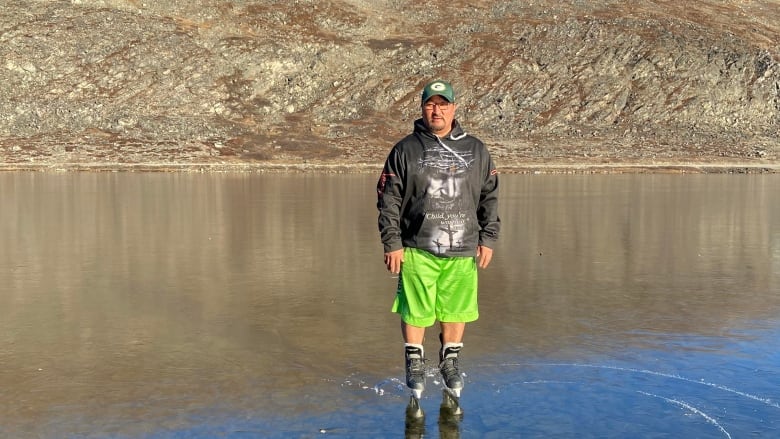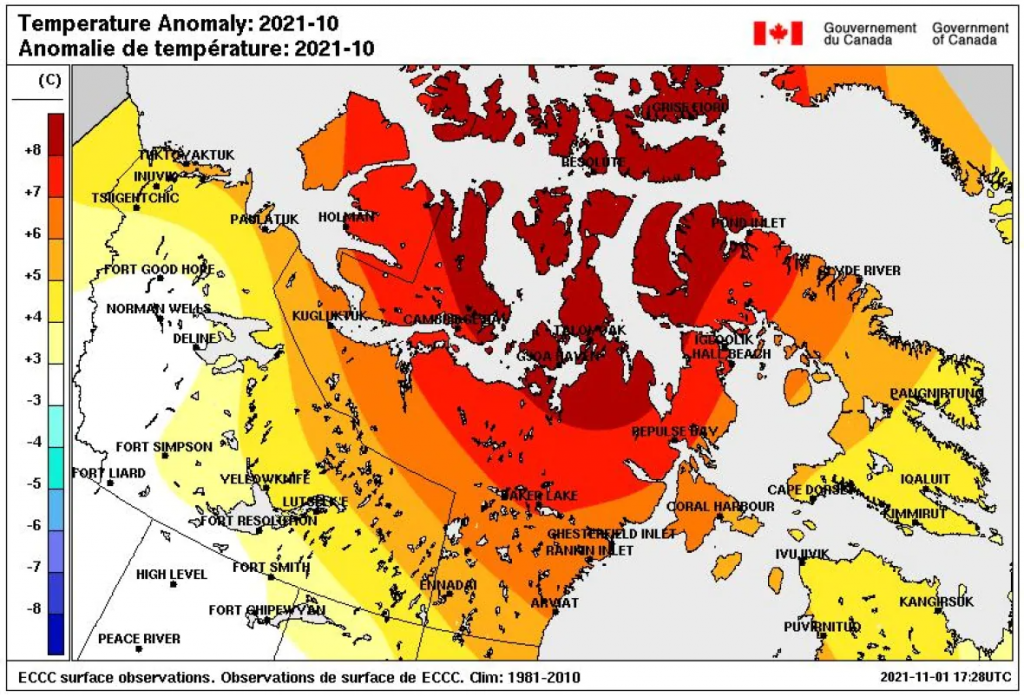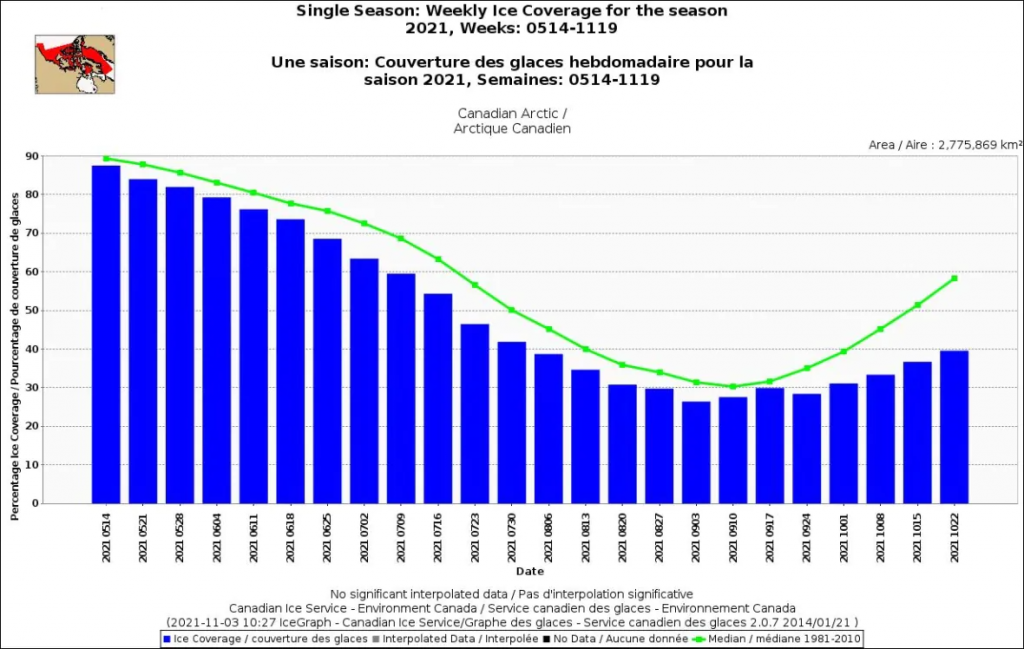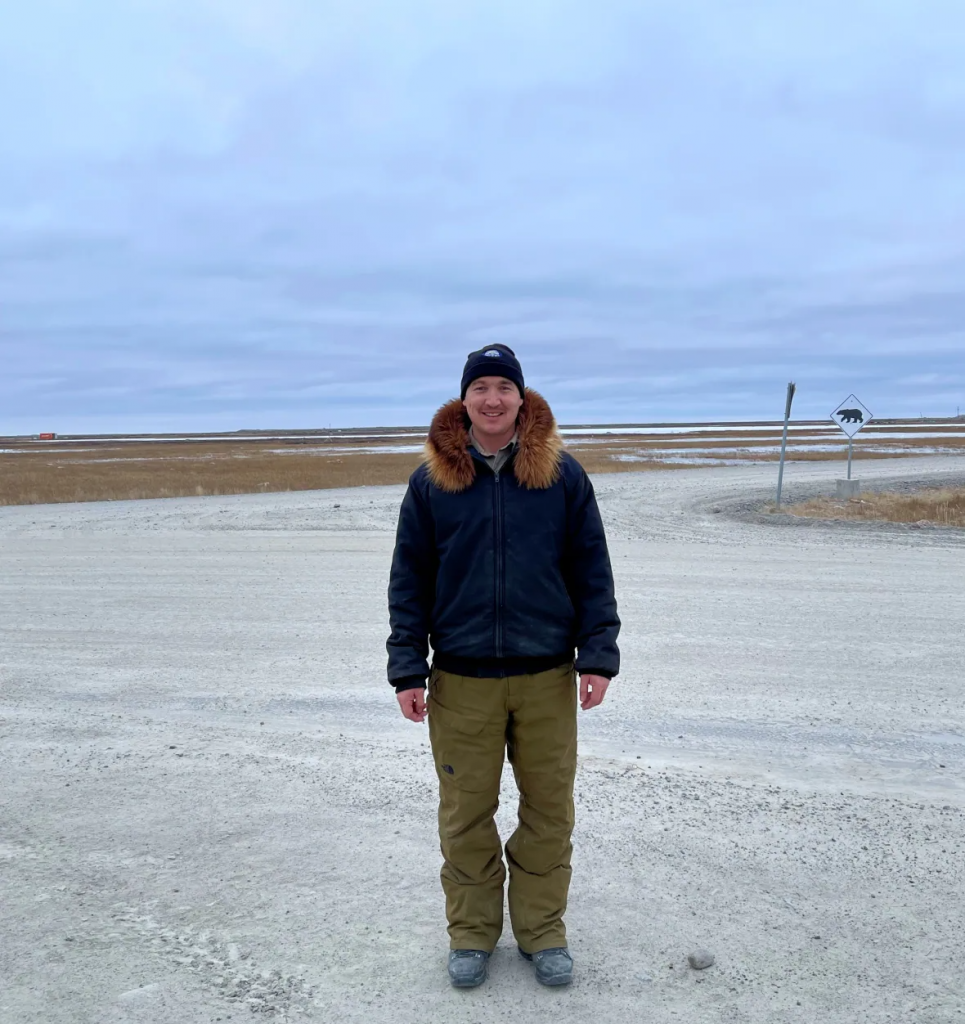October saw ‘extraordinary, record-setting heat’ in parts of Arctic Canada

Our planet is changing. So is our journalism. This story is part of a CBC News initiative entitled Our Changing Planet to show and explain the effects of climate change and what is being done about it.
In late October, when there’s usually snow on the ground in Kangiqsujuaq, Que., and chillier weather, Peter Qissiq instead went out ice skating in a pair of shorts.
“It’s not pretty cold yet,” he said. “To me it was amazing, skating with shorts on.”
While he described the day as beautiful, Qissiq said it might point to something else.
“Climate change,” he said, “is here.”
Qisiiq, 47, said he remembers having “lots” of snow in October, when he would go hunting by snowmobile. This year, he said, people are hunting by other modes, like canoes.
Qisiiq is not the only northerner to notice the warm weather.
5 to 8 C above normal in most of Nunavut
October “produced extraordinary, record-setting heat” across Nunavut, according to Environment and Climate Change Canada.
The agency said on Twitter that across 22 climate stations, 135 daily maximum temperature records were broken in the territory. Many parts of Nunavut averaged 5 C above normal, with a large area above 8 C.

Arviat, Cambridge Bay, Baker Lake, Rankin and Resolute had the warmest October on record. Nunavik, in northern Quebec, also saw warmer than usual temperatures.
There has also been a reduction in ice concentration, the agency said, with data showing large areas of the Arctic that would normally be ice-covered this time of year still ice-free.
In the first six days of the month alone, Nunavut communities saw 47 daily record temperature records broken.
David Phillips, a senior climatologist with Environment and Climate Change Canada, said this warmth came from southerly air with high pressure sitting in eastern Canada.
‘The snow is coming in late every year’

Leo Ikakhik, 58, has spent his whole life in Arviat, Nunavut, which sits on the western coast of Hudson Bay. He remembers the roads in town and the land being covered with snow in October.
“It seems like every year it’s really slow freezing up,” Ikakhik said.
This past summer and into fall has been rainy, with hardly any snow.
“I don’t remember that we had the rain this long,” Ikakhik said. “Seems like the snow is coming in later every year.”
Ikakhik, who patrols for polar bears in the community, said he’s been dressing for “between” seasons. Instead of winter boots, he’s wearing his rubber boots with extra socks.
“If you try to put your winter boots on, you’re only going to get them wet,” he said. “It looks like it’s warming up every year.”
In Baker Lake, Nunavut, where Jeff Seeteenak has lived his whole life, the ground would normally be frozen by now, with people out snowmobiling. This fall, it’s been wet and slushy.
“It’s not normal,” Seeteenak said. “We knew [the season] was different from end of August when the raining started and didn’t stop.”
I have never seen it like this late in October. We should be driving our snowmobiles by now. Baker Lake should be frozen over now, we should be putting our nets out. pic.twitter.com/i8Oeydrj7c
— jeff seeteenak (@jeffseeteenak) October 29, 2021
Last weekend, he went out hunting with his ATV, but he couldn’t go over the ponds as the ice wasn’t yet thick enough to go over.
“They just started freezing over a little over like a week ago,” Seteenak said, “when they should have been frozen for about two and a half, three weeks now.”
And earlier last month, he got bug bites after he went out hunting — and that wasn’t normal either.
Connie Naulaq in Iqaluit said on Twitter that normally a windy day like Nov. 2 would mean a snow storm, but with the milder weather and lack of snow, it’s more like a dust storm.
What a windy day! If we had snow it would be a blizzard. Instead we get a sand storm. And we still have an Oil tanker in the inlet. It’s November right? #iqaluit #nunavut #home #windy #inlet #oiltanker #sandstorm @MurphTWN pic.twitter.com/WjO8BEa46C
— Connie Naulaq (@NaulaqKaani) November 2, 2021
Northern communities on ‘forefront of climate change’
Sara Hoffman, a meteorologist with Environment and Climate Change Canada, said breaking temperature records lately has become “pretty common.”
That’s partly because some parts of the North only have weather records going back to about the 1980s or 1970s, she said.
“It’s a little bit easier to break a record, if your [length of] record isn’t that long,” she said, but added that the number of records being broken is “definitely significant.”

Hoffman said communities in the Arctic all over the world, and especially in Canada, are on “the forefront of climate change.
“They’re feeling the very first impacts of climate change because they’re warming at a rate much quicker than … in the South.”
Hoffman said thawing permafrost is one of the biggest impacts, including the way thawing permafrost affects northern coasts, which is where nearly all Nunavut and Nunavik communities are found.
“They have whole buildings that are at risk of falling into the water or, you know, parts of important buildings having to be relocated or shored up and structural integrity being questioned because of thawing permafrost,” she said.
Thawing permafrost also makes the ground in communities less stable, she said.
“If you can’t even trust the ground you’re walking on, you know, that’s everything that’s so important.”
Thin Ice
Arviat Mayor Joe Savikataaq Jr., said autumns have seemed to be getting longer in his community over the years. Some people have even had to be rescued from water bodies in town in the past few weeks, he said, after driving over thin ice.

“Right now people would [normally] be out by ATVs driving over ponds and creeks and rivers. You can’t do that right now. Because it’s not cold enough,” he said. Though added, “it’s everyone’s responsibility to make sure it’s safe,” before going out on ice.
There is a positive side to a slow start to winter, according to Savikataaq.
“Everyone is 100 per cent reliant on fossil fuels to heat our homes. And with this unusual, mild weather, that means heating systems don’t have to work as hard,” he said.
“At least we’re burning that much less heating fuel to heat the many homes across Nunavut.”
-With files from Toby Otak
Related stories from around the North:
Canada: Continued sea ice loss could alter food web for some Arctic marine predators, says Canadian study, Eye on the Arctic
Finland: Climate change worries Finland’s young reindeer herders, Yle News
Norway: Norway’s new government highlights fight against climate change and continued oil drilling, The Independent Barents Observer
Greenland: Greenland to join Paris climate agreement, Eye on the Arctic
Russia: City in Arctic Russia cooling ground to preserve buildings on thawing permafrost, The Independent Barents Observer
Sweden: Sweden aims to be ‘role model and bridge builder’ on climate change, Radio Sweden
United States: Author Q&A – Welp: Climate Change and Arctic Identities, Eye on the Arctic



